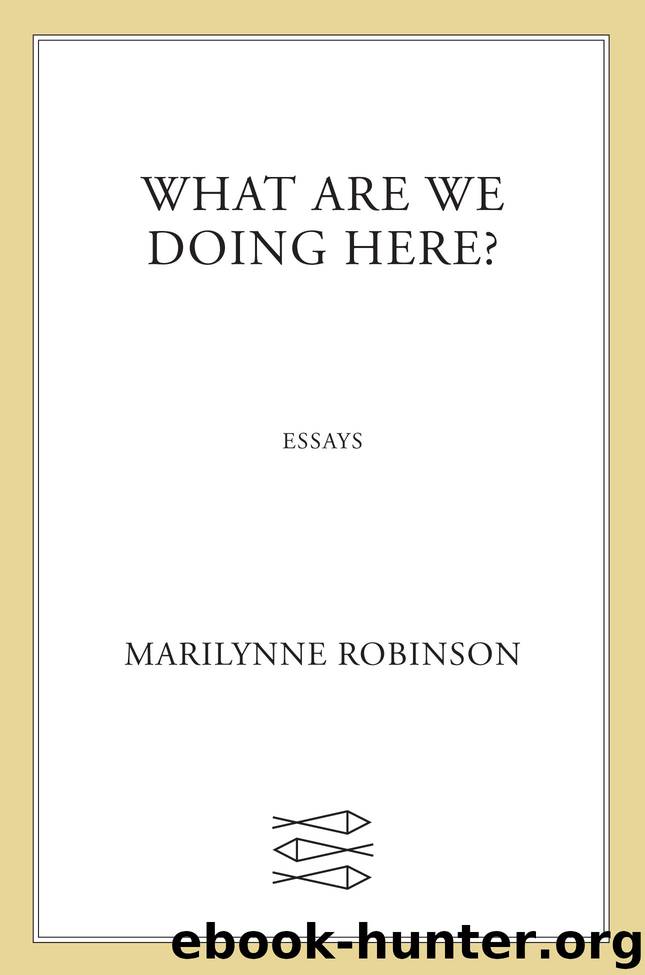What Are We Doing Here? by Marilynne Robinson

Author:Marilynne Robinson
Language: eng
Format: epub
Publisher: Farrar, Straus and Giroux
Mind, Conscience, Soul
Plenary Address at the Religious Affections in Colonial North America Conference, Huntington Library, San Marino, California: January 27, 2017
I am deeply indebted to Jonathan Edwards. Reading him in college—assigned portions of The Great Christian Doctrine of Original Sin Defended—made me aware of a much more plausible ontology than anything compatible with the ugly determinisms on offer then and now in courses on philosophy and psychology. I could put a name to my discontents because I had an older brother who shared them. But I got past them finally one particular afternoon, reading from a nineteenth-century edition of Edwards’s Works. Everything about this assignment suggested drudgery. But that hour felt like an awakening, so to speak, as if a great burden had been lifted from my soul. I recognize the irony of my having been rescued by precisely this text. In it Edwards describes Being as emergent and the continuities we depend on not as intrinsic but as wholly sustained by God. So reality is indeterminate within a very broad and arbitrary frame of probabilities and possibilities, until it happens. In other words, Edwards dismisses the narrow causal channel of conventional deterministic thinking, which is also essential to Freudianism, Skinnerism, Marxism, or neo-Darwinism. His purpose is to defend the traditional doctrine that implicates all generations in the sin of Adam, without reference to individual transgression. He asserts another, higher-order determinism, which is the freedom of God, constrained only by his own nature. Very characteristic of recent theories about humankind is the assumption that we are the creatures of our race or genes or the traumas we have suffered or the shape of our brains. These theories have been put aside one after another as they are found to be based in errors of fact that yield errors of reasoning, or vice versa. Edwards taught me how to understand that something much richer and stranger is going on than any of these schemes can begin to suggest. I realize I am involving myself in complicated thoughts about a treatise that is not my subject. My purpose is simply to say that I have long seen Edwards very differently than as the black-clad cleric with spiders on his mind. His conception of Being as emergent opened Emerson, Dickinson, Melville, and Whitman to me, and William James as well. He helped me wonder constructively about what Puritanism actually was. He certainly made me wonder what I was looking at when I read his work and theirs.
It seems the universe is a kind of foam, huge voids with filaments of conventional matter, galaxies, constellations, and so on surrounding them like the skin on bubbles. These voids grow. They put enormous pressure on matter, pressure so great that the force of it is attributed in some part to dark energy, of which we know nothing. It, with these voids, may account for the accelerating expansion of the universe, with consequences so profound that a human observer, however well equipped, living one or two billion years from now (granting that there might be such a creature), would see nothing but void.
Download
This site does not store any files on its server. We only index and link to content provided by other sites. Please contact the content providers to delete copyright contents if any and email us, we'll remove relevant links or contents immediately.
The Rules Do Not Apply by Ariel Levy(4946)
Bluets by Maggie Nelson(4541)
Too Much and Not the Mood by Durga Chew-Bose(4324)
Pre-Suasion: A Revolutionary Way to Influence and Persuade by Robert Cialdini(4205)
The Motorcycle Diaries by Ernesto Che Guevara(4078)
Walking by Henry David Thoreau(3946)
Schaum's Quick Guide to Writing Great Short Stories by Margaret Lucke(3368)
What If This Were Enough? by Heather Havrilesky(3302)
The Daily Stoic by Holiday Ryan & Hanselman Stephen(3292)
The Day I Stopped Drinking Milk by Sudha Murty(3184)
The Social Psychology of Inequality by Unknown(3011)
Why I Write by George Orwell(2942)
Letters From a Stoic by Seneca(2784)
A Short History of Nearly Everything by Bryson Bill(2679)
A Burst of Light by Audre Lorde(2586)
Insomniac City by Bill Hayes(2535)
Feel Free by Zadie Smith(2473)
Upstream by Mary Oliver(2382)
Miami by Joan Didion(2362)
